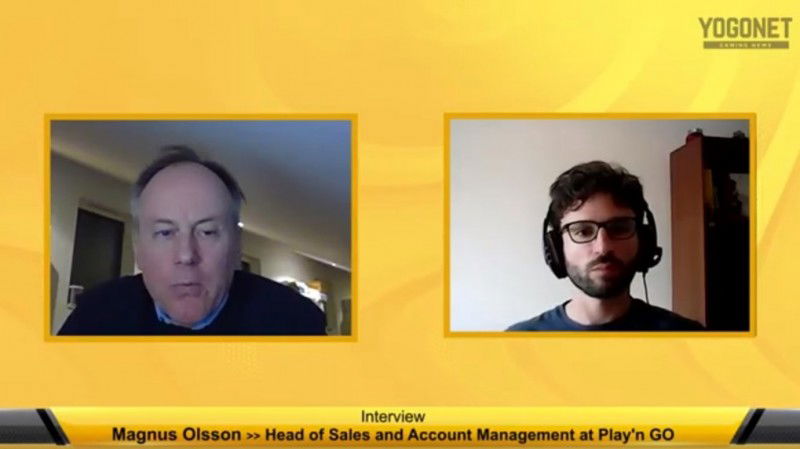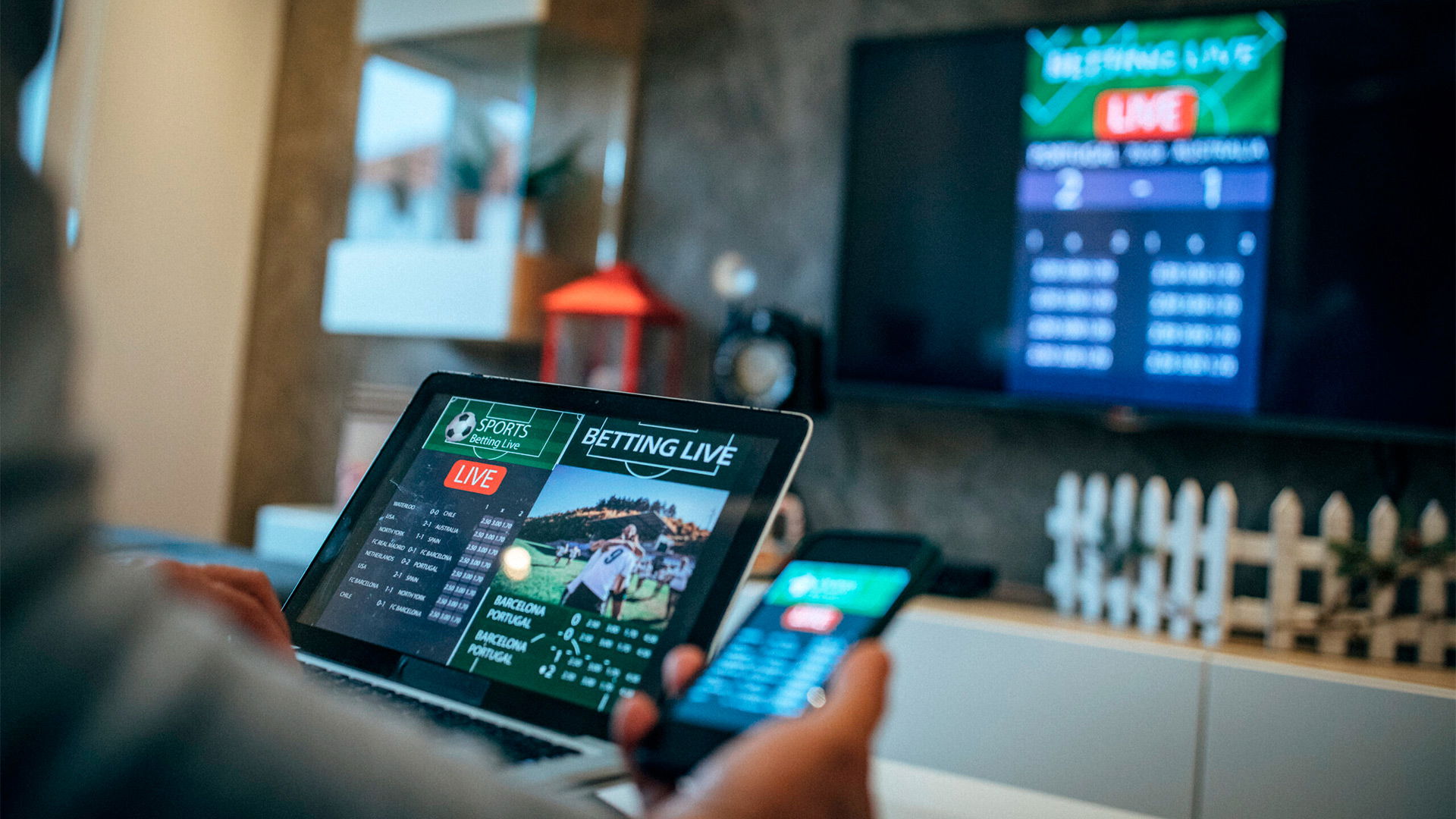"There are ways for us to drive traffic from online to land-based and back-and-forth"

In 2020, Play'n GO ramped up the production of games significantly to 52 games on basically one game a week, according to its Head of Sales and Account Management Magnus Olsson. In a video interview with Yogonet, he said that in 2021 the company is aiming for 60 games, "and we'll do it a bit differently this year. I think you can expect about a game a week from us, and then on top of that we will add a couple of surprises that will be outside of the normal," in what he described as the overall roadmap this year.
In terms of markets, Olsson sees Latin America growing for Play'n GO, as the supplier more than doubled its business there in 2020. In Europe, he welcomes that regulation is moving in into almost every country. "What happens in the UK is that the regulation puts pressure into the system, and you can discuss the details on the regulation, but the end goal is very similar to what we want. The regulators in the UK want to provide a safe and reliable environment for online entertainment, and that is our business purpose, we want to provide safe and reliable digital entertainment. In the long-term, in a country like the UK we see enormous potential and growth, and we see it where we can work in very close partnerships with the operators, and the regulators for that matter, to fulfill that promise of safe digital entertainment."
Particularly on the review of the Gambling Act 2005 that the government is currently undertaking, Olsson believes some things could be done differently. "I'm not a big fan when regulation is micromanaging how the games perform. I think there are two forces at play here. One is to try to provide safety and trust, which is good. And the other one is trying to limit or suppress the industry, which is bad. I would say that the politicians and the people behind the laws might be torn between... they want the taxes, they want the income, and they also want to look as they're standing up towards something that might be perceived as a bad thing. I think the way out of that is to focus on the entertainment side and focus on providing an entertainment industry in a safe environment. There are details in the regulations I think are completely wrong, I do agree on the main purpose behind the regulations, aiming for that safety.
When asked about the US, Olsson said that Play'n GO expects its games to be live in New Jersey around July this year. "So we're well ahead in the process there, and then we have two or three other states in the pipeline after that," he said. "I think this is an area where we can come in from Europe, we can bring our experience and we know what works and what doesn't work in Europe, part of that will be applicable in the US for sure, and if we do this right we can add a lot of value to the US markets, so I'm very much looking forward to that. And I also think we have content that suits those markets, definitely." He added that entering the US market needs time, money and a lot of resources.
In terms of other new markets, the gaming supplier entered Switzerland just a couple of months ago, and Olsson said it is going into Greece within days or weeks. The company is also looking at Georgia, Ukraine in Eastern Europe, "both very interesting markets, they are a bit further down the pipeline. And at the same time we have Germany and the Netherlands working on regulations. These are already now major markets for us, so as soon as there's regulation there, we will work to be part of it from day one, that would be the ambition."
Moreover, Olsson said Japan would be a good market for the company, but given the delays, back and forths on the integrated resorts discussion, "that's on the back burner" for now. As for Buenos Aires, Argentina, Play'n Go is "well ahead with both the city and the province, and as soon as everything is ready we will be there definitely this year, hopefully within weeks." He also said he "would really like to see Brazil regulate, and we have a portfolio of games that's almost tailor-made for Brazil, with our bingo games, so I can't wait for that to happen."
Olsson outlined three pillars for the company's road map. One is the saga or sequels, which is being built differently than in 2020, expanding the content outside of the slots and online casino world, so it becomes a story or media event on its own. Secondly, the partnerships with the IP games will see that instead of just buying the property rights for a song or a name, the company will enter collaborative agreements with the artist or the performer where that specific artist is involved with the creation of the material and the game, the marketing and the sales of it. "This year we will have between four and six different collaborations with very big names in the industry, also names that resonate very well with the US markets," he anticipated.
The third pillar is innovation, "taking slots and online casino to the next level. We took some steps with Gold Volcano, Diamond Vortex and a few other games last year where we create slot games that have math, graphics and a look and feel that that hasn't been seen before, se we're going to build on that as well."
Pandemic effects and challenges for the gaming industry
Magnus Olsson said the pandemic has accelerated something that was happening anyway. As it happened with Netflix, Uber or Airbnb, "if something can be digitalized it will be digitalized. That is not something that you can try to stop, there's no going back on that trend. What happened in 2020 was that we moved 5 years ahead in the development in one year."
He said the impact for land-based casinos has been "terrible, they are fighting for their lives now," adding that the way forward for them is to embrace the digitalization and make it work for them. Addressing the need to attract new customers, Olsson shared his insights regarding millennials. "If they are going to do an activity like going to a casino, that activity has to be able to be shared online, people have to react on it, people have to be able to interact with that experience that they are sharing online. If there's no interaction with social media and digitalization of that event, you will not get millennials to visit your casino. They have different interests, and you have to appeal to a culture that is interested in healthy food, animal rights, gender equality, all those things need to be there if you want that audience that is now online. So there is a great opportunity for brick-and-mortar casinos to embrace this and to build something that is co-existing and working together with online. There are ways for us to drive traffic from online to land-based and back-and-forth. There are technology and marketing things we can do together, but it requires that land-based and online work hand-in-hand, and not as competitors."
As for the challenges for the gaming industry in general, Olsson underlined regulation issues, which drive up costs for operators. "That means shrinking margins, and for a while, the operator solution to that was to push the cost downstream to suppliers, but that's not a viable route anymore, because that reached its end. So now they need to improve their top-line and bottom-line at the same time, they need to grow revenue, cut costs and maintain the margins. So that drives mergers and acquisitions as we've seen, lots of that in Europe and I expect much more."
"Look at Flutter for example. They've got so many great brands under their wings now with Paddy Power, Betfair, PokerStars, FanDuel, Sky. That's an awesome company, how do you compete with that? You need to match them in size, and you need to give them that fight on all those markets, and with all those profiles," Olsson continued. "My opinion is that you do that with quality and differentiation, you need to be able to acquire not only your competitors' customer, because there's a circle where much of the acquisition is moving players from one operator to another. You need to get net new players in, again I'm getting back to the millennials. You don't reach them with TV commercials for example, you have to do something else. How do you reach millennials? That's what the operators need to think about, how do they build up a new customer base? You might frown at the millennials because they have no money, but in five years they're going to sit on 30% of the wealth in the world."
"There won't be any room to push content that is not good enough, because even if you have shaped lower-quality content, you push that and there's no audience, then you lose the audience, they move away, and you lose long-term revenue. So the winners will be the ones who look beyond that, who can maintain a strategy that's multi-year, and then build on that and execute on it with trust and belief in themselves," Olsson concluded.
Watch the full video interview with Magnus Olsson on our YouTube channel.















































